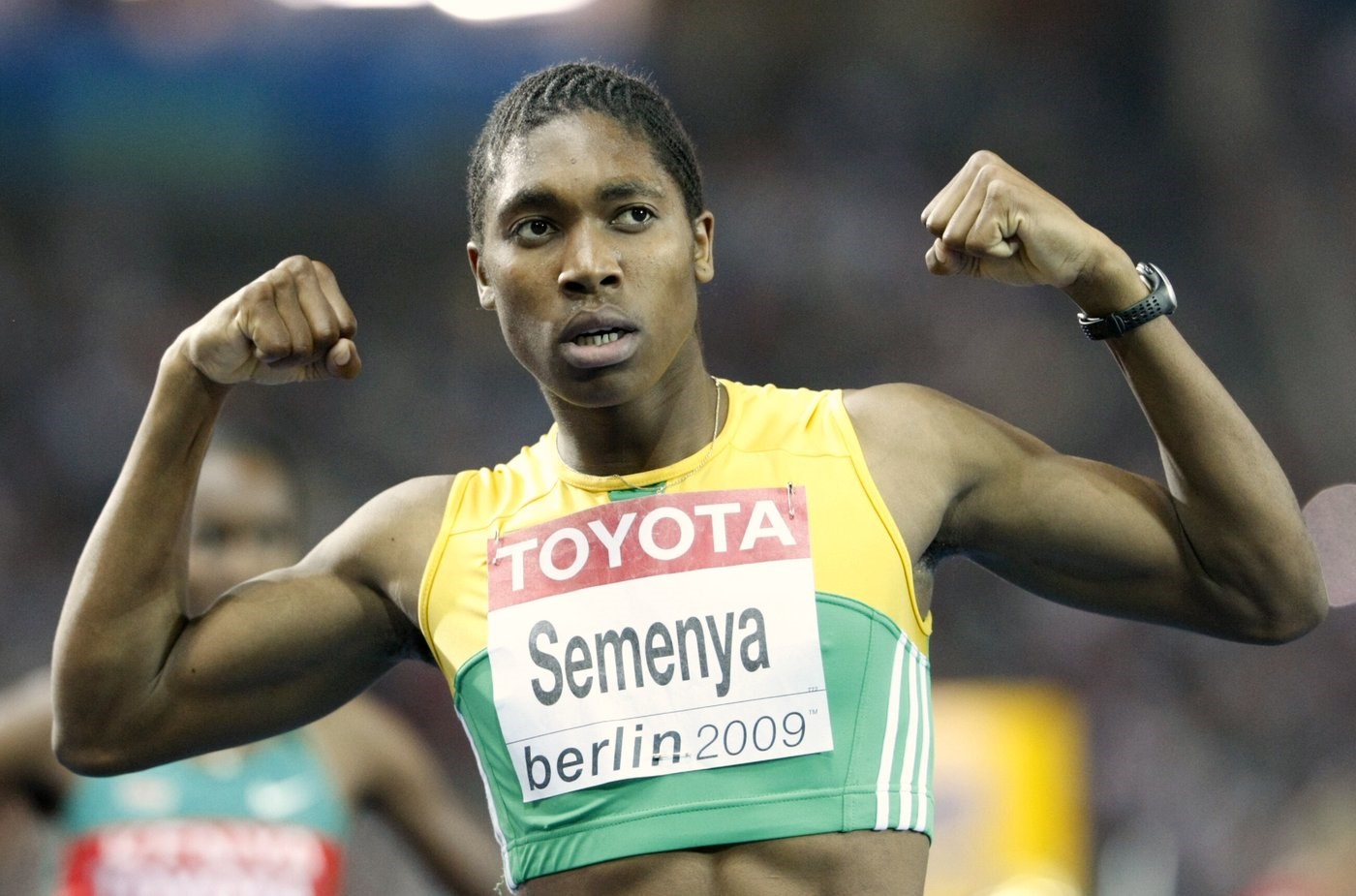
FILE -South Africa's Caster Semenya celebrates after winning the gold medal in the final of the Women's 800m during the World Athletics Championships in Berlin on Aug. 19, 2009. (AP Photo/Anja Niedringhaus, File)
July 10, 2025 - 12:18 PM
CAPE TOWN, South Africa (AP) — One of the most complex current issues in sports can be traced back to a track meet in Germany in 2009, when an unknown 18-year-old from South Africa blew away a field of the best female runners on the planet to win the world title. The teenager was hardly out of breath when she flexed her muscles at the end of it.
What quickly became clear is that sports faced an unprecedented dilemma with the arrival of Caster Semenya.
Now a two-time Olympic and three-time world champion in the 800 meters, the 34-year-old Semenya has been banned from competing in her favored event since 2019 by a set of rules that were crafted by track authorities because of her dominance.
They say her natural testosterone level is much higher than the typical female range and should be medically reduced for her to compete fairly against other women.
Semenya has refused to artificially alter her hormones and challenged the rules claiming discrimination at the Court of Arbitration for Sport court in Switzerland, then the Swiss Supreme Court and now the European Court of Human Rights.
A ruling Thursday by the highest chamber of the European court — Semenya's last legal avenue after losing at the other two — found that she was denied a fair hearing at the Swiss Supreme Court.
It kept alive Semenya's case and reignited a yearslong battle involving individual rights on one hand and the perception of fairness in sports on the other, with implications across the sporting world.
A complex issue
Semenya is not transgender and her case has sometimes been inaccurately conflated with that of transgender athletes. She was assigned female at birth, raised as a girl and has always identified as female.
After years of secrecy because of medical confidentiality, it was made public in 2018 that she has one of a number of conditions known as differences of sex development, or DSDs. They are sometimes known as intersex conditions. Semenya was born with the typical male XY chromosome pattern and female physical traits. Her condition leads to her having testosterone levels that are higher than the typical female range.
World Athletics, the track governing body, says that gives her an unfair, male-like advantage when racing against other women because of testosterone's link to muscle mass and cardiovascular performance. It says Semenya and a relatively small number of other DSD athletes who emerged after her must suppress their testosterone to below a specific level to compete in women's competitions.
The case has transcended sports and reached Europe's top rights court largely because of its core dispute: Semenya says the sports rules restrict the rights she has always known as a woman in every other facet of life and mean she can't practice her profession. World Athletics has asserted that Semenya is “biologically male."
How the rules work
Track and field's regulations depend on the conclusion that higher testosterone gives rise to an athletic advantage, though that has been challenged in just one of the many complicated details of Semenya's case.
To follow the rules, DSD athletes must suppress their testosterone to below a threshold that World Athletics says will put them in the typical female range. Athletes do that by taking daily contraceptive pills or using hormone-blocking injections and it's checked through regular blood tests.
Track first introduced a version of its testosterone regulations in 2011 in response to Semenya and has made them stricter over the years. The current rules require athletes affected to reduce their testosterone for at least two years before competing and throughout competitions, effectively meaning elite DSD runners would be constantly on medication to stay eligible for the biggest events like the Olympics and world championships.
That has troubled medical experts and ethicists, who have questioned the “off-label” use of birth control pills for the purpose of sports eligibility.
Semenya is not alone
While Semenya is the only athlete currently challenging the regulations, three other women who have won Olympic medals — Francine Niyonsaba of Burundi, Margaret Wambui of Kenya and Christine Mboma of Namibia — have also been sidelined by the rules.
The issue came to a head at the 2016 Olympics in Rio de Janeiro, Brazil, when Semenya, Niyonsaba and Wambui won the gold, silver and bronze medals in the 800 meters when the rules were temporarily suspended. Supporters of the ban cited that result as evidence they had an insurmountable advantage over other women.
World Athletics is now considering a total ban on DSD athletes like Semenya. Its president, Sebastian Coe, said in 2023 that up to 13 women in elite track and field fell under the rules without naming them.
What Thursday's decision means
Track's DSD rules became a blueprint for other sports like swimming, another high-profile Olympic code that has regulations. Soccer is considering testosterone rules in women's competitions.
Sex eligibility is a burning issue for the International Olympic Committee and new president, Kirsty Coventry, who was elected in March. It was brought into urgent focus for the IOC after a sex eligibility scandal erupted at last year's Paris Olympics over female boxers Imane Khelif of Algeria and Lin Yu-ting of Taiwan.
Most sports will watch the direction of Semenya's case closely as it is sent back to the Swiss Supreme Court, and possibly to sport's highest court, even though that could take years. The ultimate outcome — whether a victory for Semenya or for World Athletics — would set a definitive precedent for sports because there has never been a case like it.
___
AP Sports: https://apnews.com/sports
News from © The Associated Press, 2025